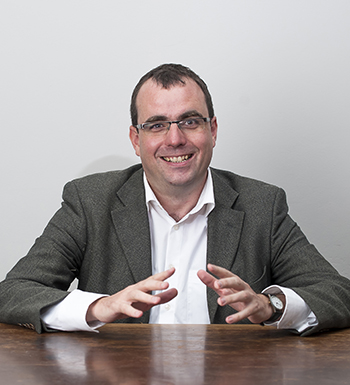
Dr Andrew Cohen, a research fellow at the University of the Free State, recently received a distinguished National Research Foundation Y1-rating.
Photo: Sonia Small |
The latest success story of the Vice-Chancellor’s Prestige Scholars Programme (PSP) is that the first National Research Foundation (NRF) Y1-rating was awarded recently to a scholar while teaching in the Faculty of Economic and Management Sciences at the University of the Free State (UFS).
Dr Andrew Cohen received this distinguished rating on 10 November 2015. It is awarded to a “young” (younger than 40) scholar five years or less post-PhD, whose curriculum vitae predicts, according to a panel of international and local reviewers, that he is poised to become a leader in his field. Dr Cohen is a research fellow at the UFS.
This rating is a reflection of Dr Cohen’s record over the past eight years, and the scholarly environment he was part of at the UFS under leadership of Prof Ian Phimister. Cohen is currently a research fellow in Prof Phimister’s International Studies Group. He taught economic history in the Department of Economics until September 2015, when he joined the School of History at the University of Kent.
Dr Cohen’s professional trajectory is emblematic of the visionary approach of the UFS Prestige Scholars Programme (PSP): to support prestige scholars with advanced mentorship, and the creation of a college of peers in order to nurture intellectual breadth and depth to generate knowledge over disciplines.
The PSP was initiated by Prof Jonathan Jansen, Vice-Chancellor and Rector of the UFS in 2011.
“Jonathan Jansen’s prestige scholars have become sought after in the academic community at large, as this recent appointment at the University of Kent indicates,” says Professor Neil Roos, co-director of the PSP. “Yet the alumni’s commitment to the programme, the university and their peers continues.”
Cohen is the editor (with Casper Andersen) of the five volume, The Government and Administration of Africa, 1880-1939. Dr Cohen’s next project is forthcoming from I.B. Tauris, The Politics and Economics of Decolonisation: The Failed Experiment of the Central African Federation.